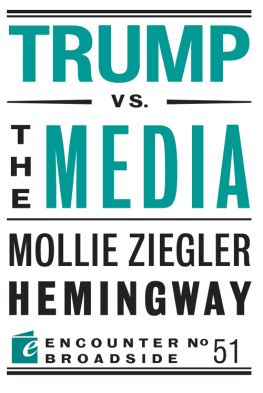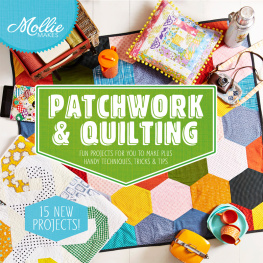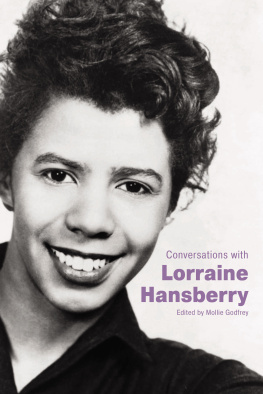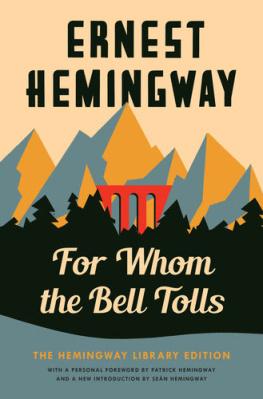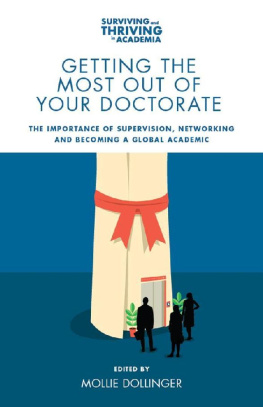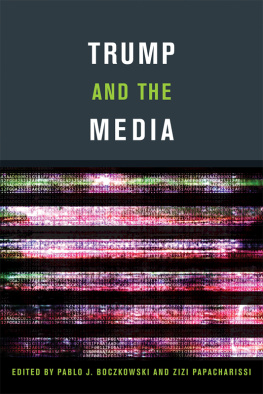T HE DAY AFTER he was inaugurated, President Donald Trump visited the CIA and announced that his attacks on the media would continue. I have a running war with the media. They are among the most dishonest human beings on earth, right? he said.
The next week, his advisor, Steve Bannon, told the New York Times that the media had been humiliated by the papers biased 2016 election coverage. I want you to quote this, he said. The media here is the opposition party. They dont understand this country. They still do not understand why Donald Trump is the president of the United States.
On February 17, Trump tweeted to his twenty-five million followers that the fake news media is not my enemy, it is the enemy of the American People! He reiterated this in a public speech a week later, making sure to clarify he was singling out fake news.
NBC News political director Chuck Todd responded on social media: This not a laughing matter. Im sorry, delegitimizing the press is unAmerican. Journalists wrote tributes to themselves about the importance of journalism, and shared the most indignant reactions to Trump on social media. Many media outlets and editors said the presidents insults were renewing their sense of mission. The Washington Post changed its motto to Democracy dies in darkness. The New York Times ran an ad campaign claiming, The truth is more important than ever, a statement indicating that for the paper the importance of truth was conditional on whether its management agreed with the politician in charge.
The media shouldnt have been surprised by what Donald Trump was doing. In speeches and on social media throughout the campaign, Trump played the part of a busy media critic, calling various news outlets fake, disgusting, and dishonest. His frequent attacks on the media were lapped up by voters, frustrated by years of uneven coverage of conservative politicians and issues. Media outlets spent much of 2016 absolutely trashing Trump and assuring viewers and readers that Hillary Clinton would easily be elected. Trump pulled off a surprise victory that demonstrated the chasm between half of the electorate and the national political media.
Donald Trumps frequent attacks on the media were lapped up by voters, frustrated by years of uneven coverage of conservative politicians and issues.
The media should have made short-term systematic changes to its news-gathering process to make sure that it would never again be so out of touch with the Americans it covers. Instead, it reacted even more hysterically, pushing conspiracy theories that Trump had won because of a scourge of fake news or Russian meddling. Believing its anti-Trump coverage had been too limited during the campaign, the media began on all-out assault of negative news against him, pushing dozens of what turned out to be false stories, such as those suggesting that transgender teen suicide rates had spiked in the immediate aftermath of Trumps election, that three states had had their elections hacked, that Trumps treasury secretary nominee had foreclosed on a ninety-year-old woman for a twenty-seven-cent payment error, that federal agencies were purging scientific data from websites, that Trump had removed a bust of Martin Luther King Jr. from the White House, and that top management at the State Department had resigned in protest.
The response to Trumps election from the media has been an admixture of anger and confusion. For decades, the press in America has been accorded a variety of perks and privileges based on the assumptions that it was integral to the success of civil society and that it would exercise its power responsibly. However, Trumps victory has advanced the developing realization among many Americans that the media has completely abdicated its responsibility and shown itself hostile to the values and ideas many Americans hold. Much of the population no longer believes the media should be treated deferentially and given the power to shape, much less control, public opinion.
H OWD W E G ET H ERE?
Complaining vociferously about the press is a Republican tradition dating back at least to Dwight Eisenhowers 1964 convention speech. Ike received a prolonged standing ovation when he said, Let us particularly scorn the divisive efforts of those outside our family, including sensation-seeking columnists and commentators, because I assure you that these are people who couldnt care less about the good of our party.
At nearly every appearance President George H. W. Bush made during his unsuccessful reelection campaign in 1992, he would display his favorite bumper sticker: Annoy the media: Re-elect Bush. The crowd would hoot and holler as Bush complained about a media that clearly signaled its preference for Bill Clinton.
Political candidates as different as Richard Nixon and John McCain made similar complaints. Conservative radio talk-show hosts spent decades dissecting the framing and spin of stories in the major media. Conservatives complained so much about media bias that it almost became trite. Liberal media critics such as Eric Altermanwho authored the 2003 book What Liberal Media?, which attempted to rebut GOP charges of media biassaid complaints about the media were little more than conservatives playing the referees. Whatever the case, journalists accepted the complaints as a part of doing business and made little to no apparent effort to improve.
In fact, they got worse.
At some point, something broke. The regular complaints about the bias were harder to ignore as the problems became more obvious. The episodes of major media malpractice are simply too numerous to list, but a few stand out for having a profound impact on undermining Americans institutional trust in the news media.
In 2005, Hurricane Katrina hit the Gulf and led to what Dan Ratheryes, the former CBS News anchor who pushed fraudulent documents to discredit George W. Bushcalled one of the quintessential great moments in television news. Yet, media critic W. Joseph Campbell wrote in Getting It Wrong: Debunking the Greatest Myths in American Journalism that the erroneous and over-the-top reporting on Katrina had the cumulative the effect of painting for America and the rest of the world a scene of surreal violence and terror, something straight out of Mad Max or Lord of the Flies. This reporting pushed racist stereotypes, scaremongering, and a political focus that emphasized national control over local solutions.
Typical of the medias antipathy to Republicans, the national news coverage laid seemingly all the problems with the hurricane response at the foot of President George W. Bush. While the Bush administration was not above criticism, comparatively little blame for the dysfunctional disaster response was placed on Louisianas notoriously corrupt and incompetent state and local governments, which at the time were predominantly Democratic. The mayor of New Orleans during Hurricane Katrina would go to prison in 2014 for taking hundreds of thousands of dollars in bribes from city contractors, and this corruption began well before Katrina. At the time of his sentencing, Nagin was the seventeenth elected official from the New Orleans area to be convicted on federal corruption or fraud charges since the hurricane.



